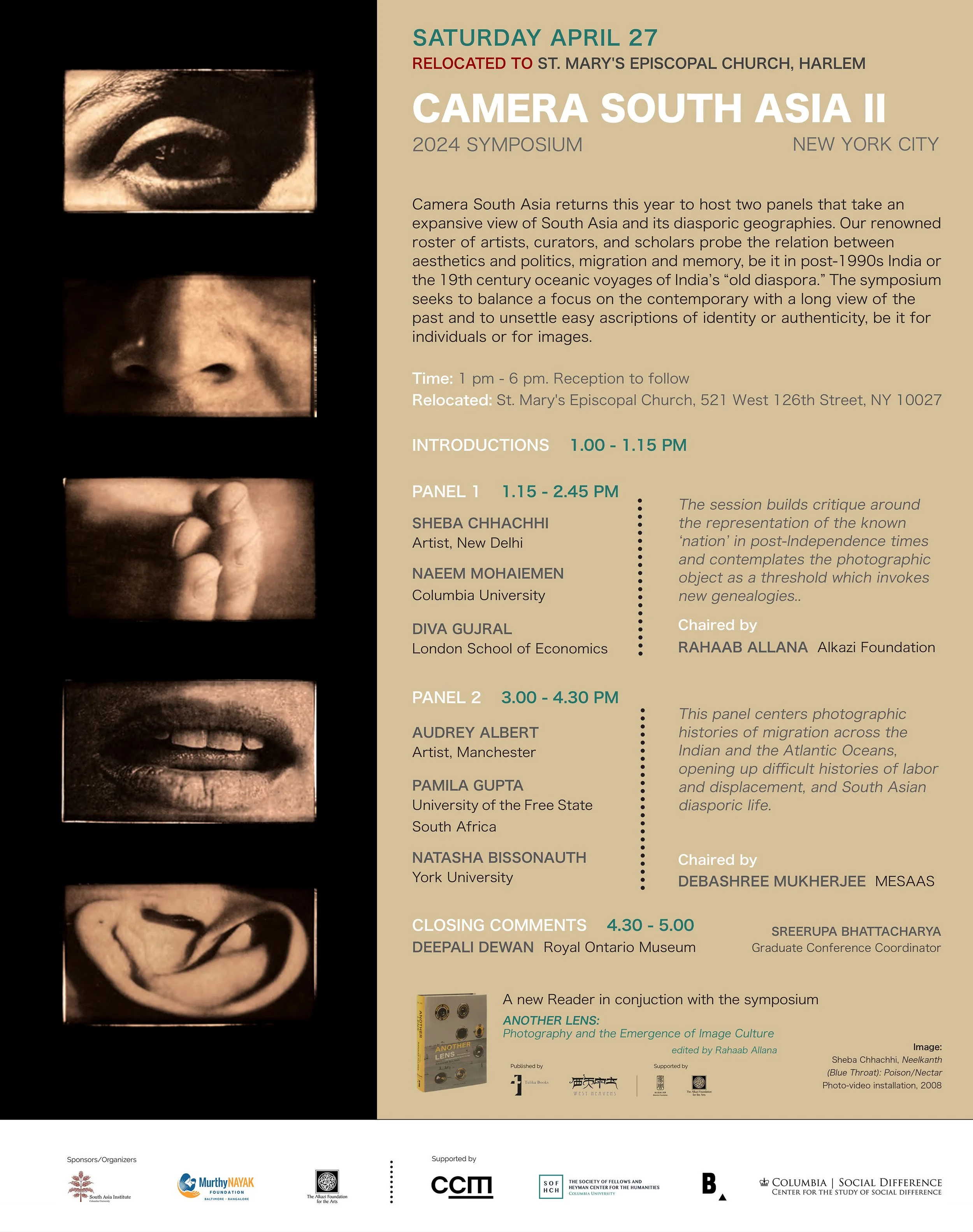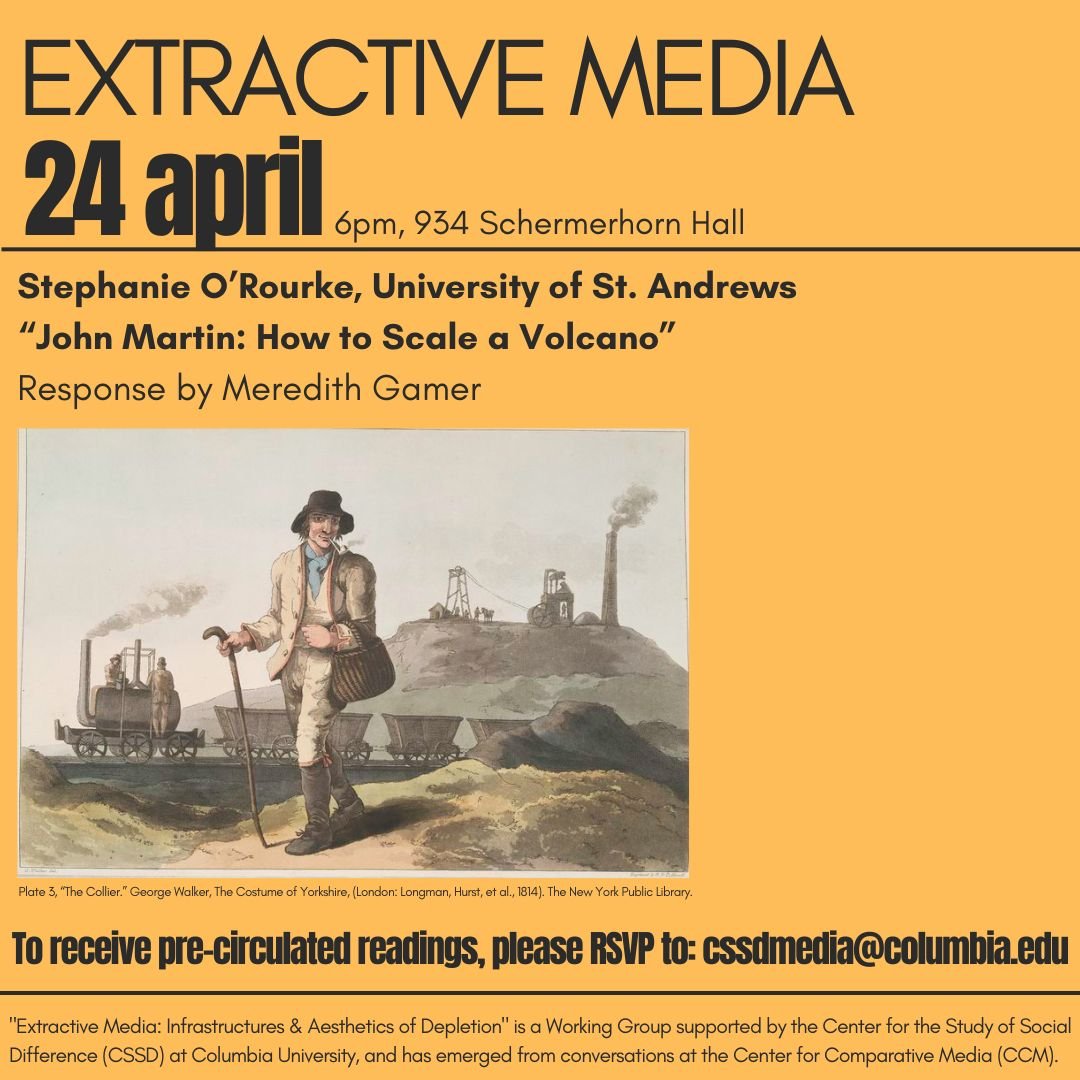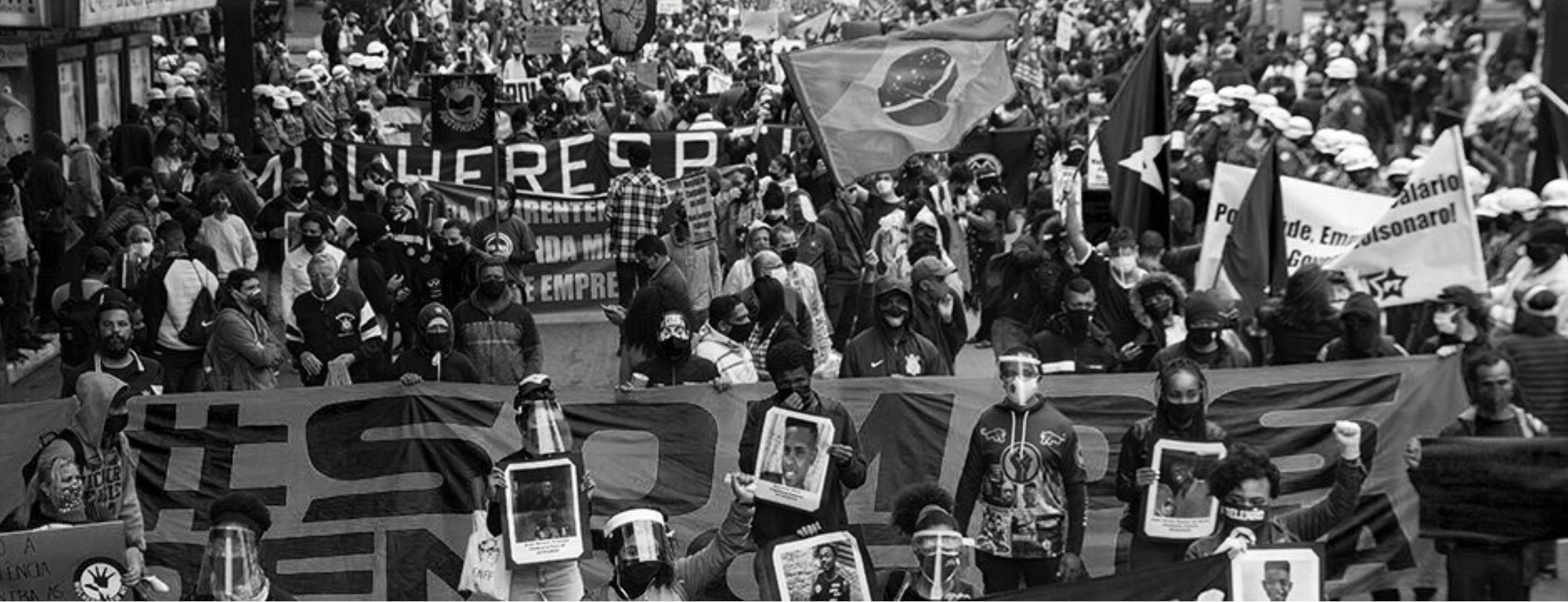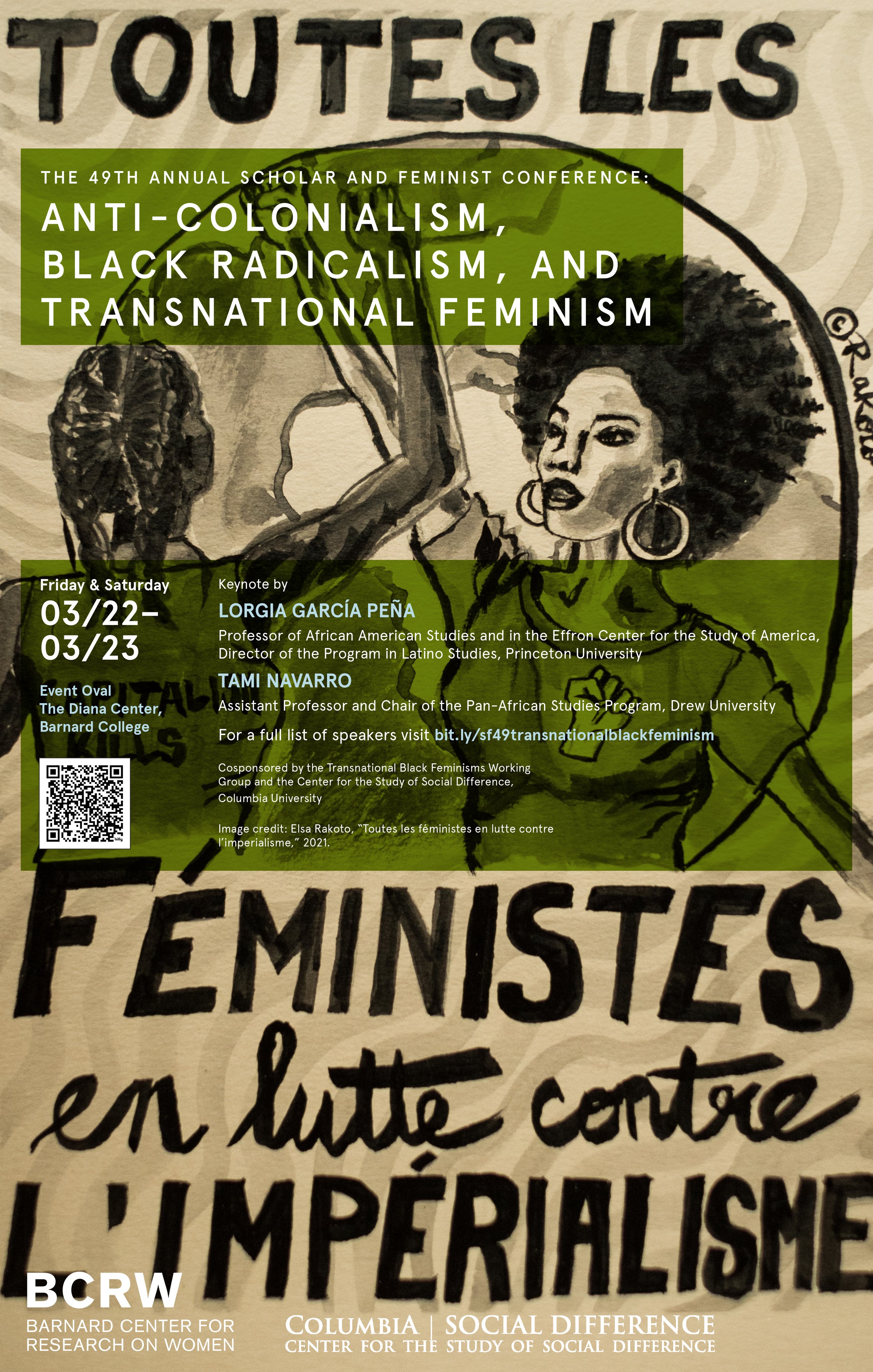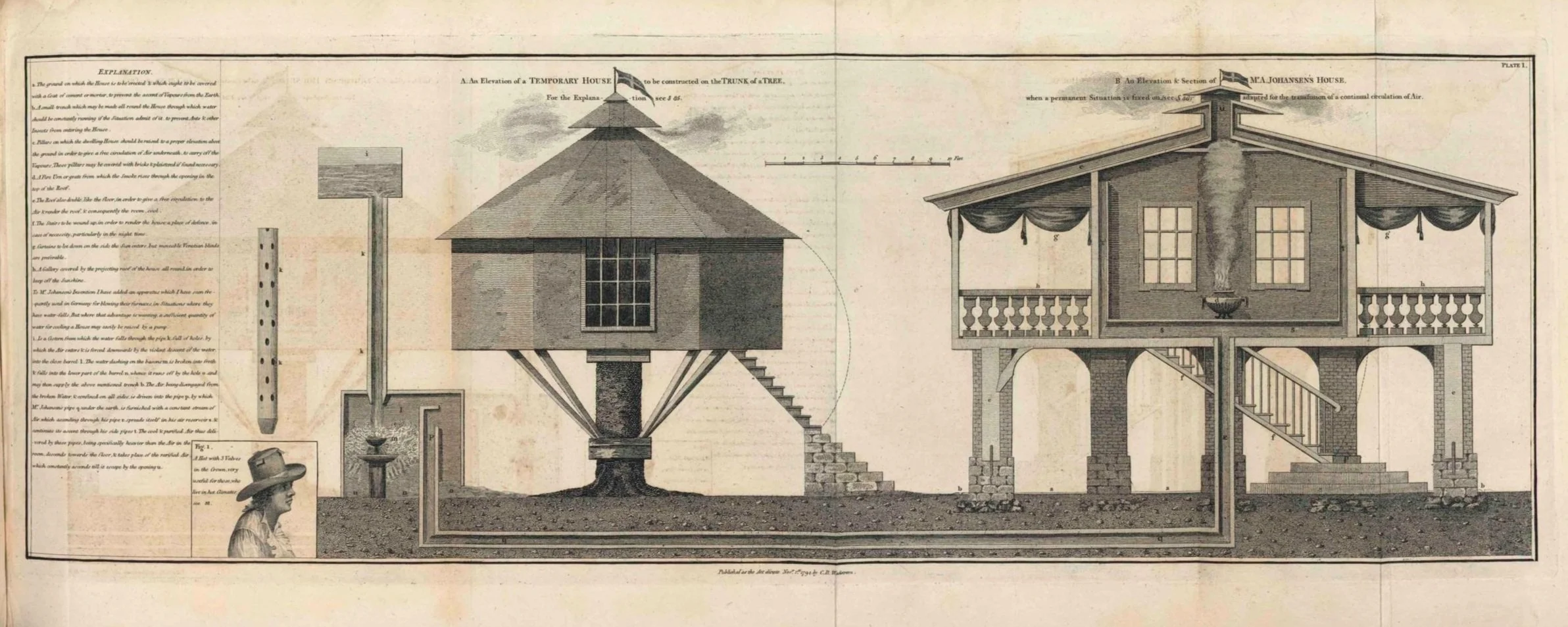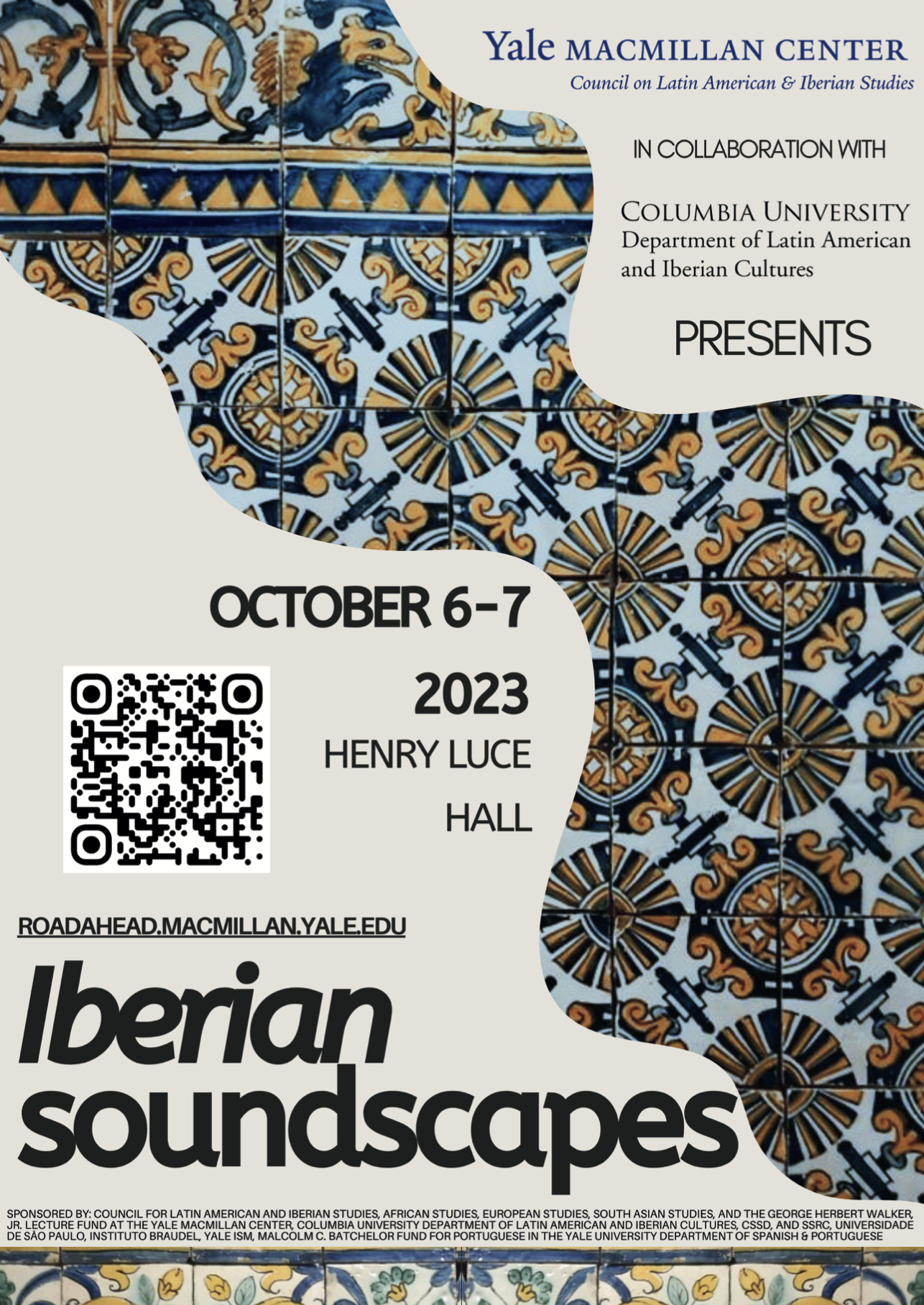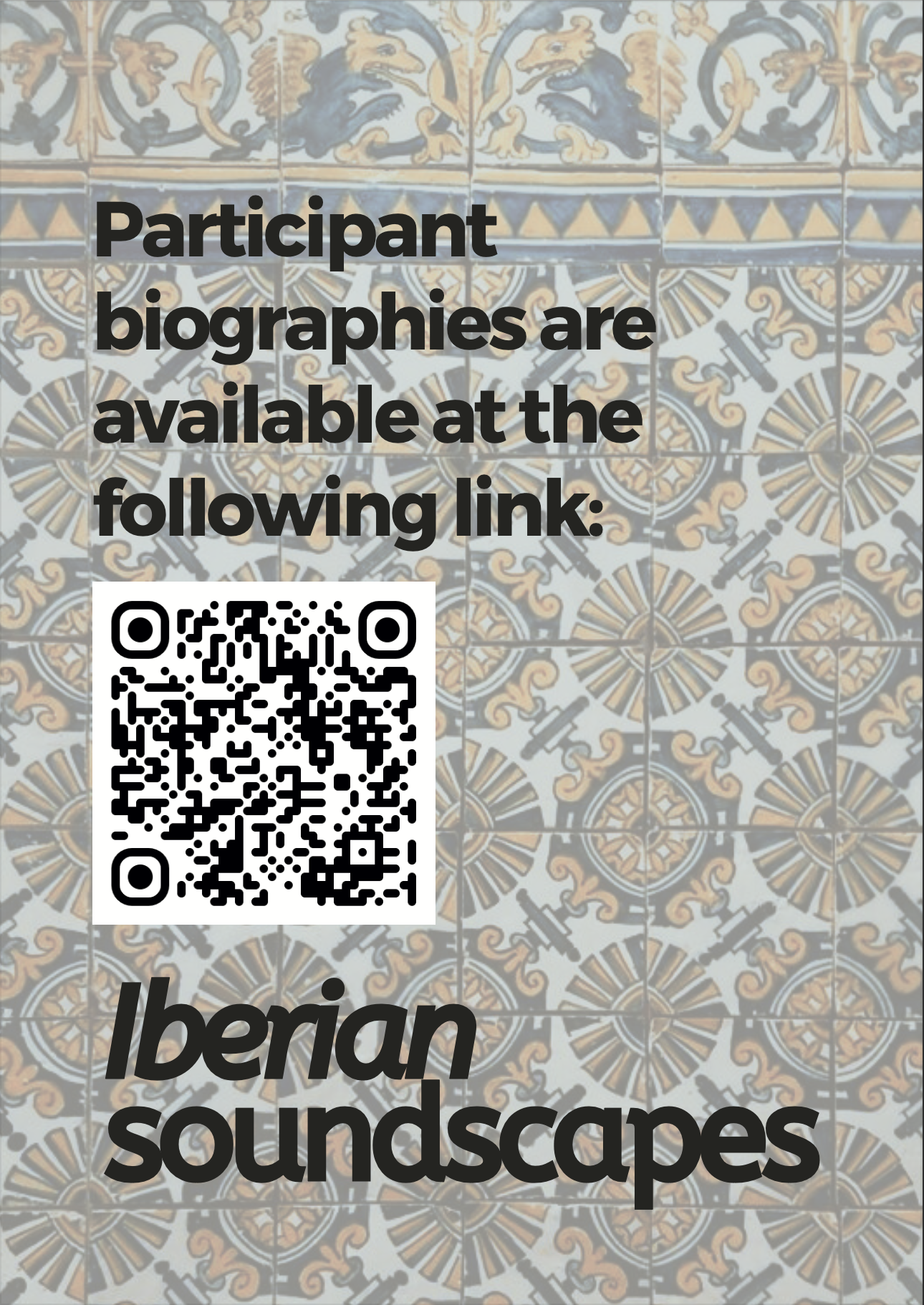
Dr. Karen O'Connell & the Gendering of "Stress"
On June 10, Dr. Karen O Connell from the University of Technology, Sydney, will join the Recovery Working Group and share her sabbatical research about the gendering of “stressˮ and how we use, or misuse, the concepts of stress and trauma to compensate women for gendered harms (especially sex discrimination and sexual harassment) or to render certain harms invisible.
Her initial reading shows that stress studies are grounded in assumptions about the inherent stress levels of various activities that donʼt match womenʼs lived experience. This work will also explore whether a compound concept such as “stressˮ can be used to encourage a more intersectional approach to harm in law.
More information on this event soon.

Iberian Seascapes
The Geographies of Injustice Working Group will be co-sponsoring and participating in the international conference, titled “Iberian Seascapes: Culture, Performance, and Resistance in Asia, Africa, and the Americas,” at the University of Lisbon on May 23-24, 2024.
Scholars from India, Portugal, Brazil, and the United States will gather for for this two-day conference to discuss themes of race, caste, law, sound, and cinema as it pertains to the "Luso-Hispanic Moment"

Camera South Asia II
The Extractive Media Working Group at CSSD will be co-sponsoring Camera South Asia II alongside the South Asia Institute as they return this year to host a conversation that takes an expansive view of South Asia and its diasporic geographies. Our renowned roster artists, curators, and scholars probe the relation between aesthetics and politics, migration and memory, be it in post-1990s India or the 19th century oceanic voyages of the subcontinent’s “old diaspora.” Camera South Asia seeks to balance a focus on the contemporary with a long view of the past and to unsettle easy ascriptions of identity or authenticity, be it for individuals or for images.
When: Saturday, April 27
1 PM - 6 PM EDT
Where: St Mary's Episcopal Church in Harlem
SCHEDULE
1-1.15pm: Introductions
ANOTHER LENS
Panel 1: 1.15 - 2.45 pm
Moderated by Rahaab Allana (Alkazi Foundation)
The panel draws upon the scholarship of a newly published reader titled Another Lens (ed. Rahaab Allana; published by Tulika and Westheavens), as part of a series called India Since the 90s. The book and this associated panel reframe lens-based practice in India through a fresh historical perspective. The panel hopes to narrate key aspects of the transformation and redefinition of photography in the 1990s – the decade marked by economic liberalization, globalization and the embedment of digital technology that revolutionized the media sphere. The contributors critically examine normative paradigms of image production, exhibition and circulation in the areas of documentary and fine art photography, journalism, cinema, contemporary arts and the archive. They also delineate new publics, emergent patterns of viewership, shifting modes of media consumption, and the diverse, technologically enabled creative trajectories that inscribe the postcolonial imaginary within the wider orbit of South Asian image cultures.
“‘Oh what a blow that phantom gave me!’”
Sheba Chhachhi (Artist, New Delhi) via ZOOM
“Camera Silence: Harmit Singh’s War”
Naeem Mohaiemen (Columbia University)
“Photography, Nation and Narration: Thinking between the 1950s and 1970s”
Diva Gujral (London School of Economics)
Tea: 2.45 - 3.00 pm
ACROSS OCEANS
Panel 2: 3.00 - 4.30 pm
Moderated by Debashree Mukherjee (MESAAS)
The contours of South Asia go far beyond territorial and national boundaries, or Cold War-era geopolitical divisions. South Asia extends into all the diasporic spaces made by workers, traders, teachers, and artists who moved out of the Indian subcontinent by choice or by necessity. This panel centers photographic histories of migration across the Indian and the Atlantic Oceans from the late 19th century to the present. Our speakers open up difficult histories of indentured labor in the Caribbean, forced displacement in the Chagos Archipelago, and diasporic photo-entrepreneurship on the Swahili coast to initiate an important conversation in the United States on the vexed and multiple trajectories of South Asian diasporic life. Through these papers, photography announces itself as simultaneously a form of biometric surveillance, aspirational self-making, and a multi-generational site of healing.
“Matter Out of Place”
Audrey Albert (Artist, Manchester)
“Looking for, Listening to ‘Crowds’ in the Capital Art Studio Collection (Zanzibar)”
Pamila Gupta (University of the Free State, South Africa)
“Renluka Maharaj’s Coolie Iconoclasm”
Natasha Bissonauth (York University)
Closing Remarks: 4.30PM
Further resources & links:
The recent declaration by the Barnard and Columbia Chapters of the American Association of University Professors (AAUP)
The demands for boycott from the Faculty and Staff for Justice in Palestine at Barnard and Columbia.
St Mary's Episcopal Church of Harlem is ten blocks from the Morningside (main) campus, and one block from the Manhattanville campus. They have a history of providing sanctuary for undocumented youth, LGBTQ youth, and opposing the gentrification of Harlem. The priest is Reverend Dr. Mary Foulke, an abolitionist. Here is an interview with her: “[W]e’ve asked you for help, and you gave us a raid.”

"John Martin: How to Scale a Volcano" with Professor Stephanie O'Rourke
Plate 3, “The Collier.” George Walker, The Costume of Yorkshire, (London: Longman, Hurst, et al., 1814). The New York Public Library.
The Extractive Media Working Group welcomes Professor Stephanie O’Rourke for an event, titled “John Martin: How to Scale a Volcano,” on April 24, 2024.
Attendance is limited to faculty and doctoral students.
When: Wednesday, April 24, 2024
6:15 PM
Where: 934 Schermerhorn Hall, CU
Bio: Stephanie O’Rourke is a senior lecturer in Art History at the University of St Andrews. Her current book Picturing Landscape in an Age of Extraction 1780-1850 will be published in 2025 by the University of Chicago Press. Her first book, Art, Science, and the Body in Early Romanticism (Cambridge UP 2021) was awarded the British Association for Romantic Studies book prize and was supported by fellowships including from the Leverhulme Trust and the Royal Society of Edinburgh. She completed her PhD in art history at Columbia University and holds a BA from Harvard University.
Event Abstract: To what extent did landscape supply a kind of pictorial infrastructure for managing the more dangerous circulations of industrial extraction in early 19th-century Britain? The desired in-flow of natural resources like timber, coal, and water to industrial centers coincided with the rapidly escalating out-flow of threatening substances like pyrotechnic energy, noxious gases, and sewage. The artist John Martin was at pains to manage these flows in both his engineering projects and the scalar keys produced for his large-scale spectacular paintings.
This paper looks first to widespread fears about coal mining explosions and later to the urban infrastructure of water and waste to reveal how British artists encountered an environment characterized by new crises in the transit of water and waste. I examine a range of pictorial and metapictorial techniques Martin developed for responding to this crisis, including an appeal to scale effects. In early and mid-nineteenth-century Britain, scale was becoming a significant tool for British imperial governance and was likewise used to conceptualize economic exchanges, energy systems, and other complex, sometimes invisible forms of relationality animating European industrial extraction.
[Nb. The paper is a draft chapter for a book manuscript that examines how European artists addressed the emergence of a new and essentially extractive way of treating and conceptualizing the natural world at the turn of the nineteenth century.]
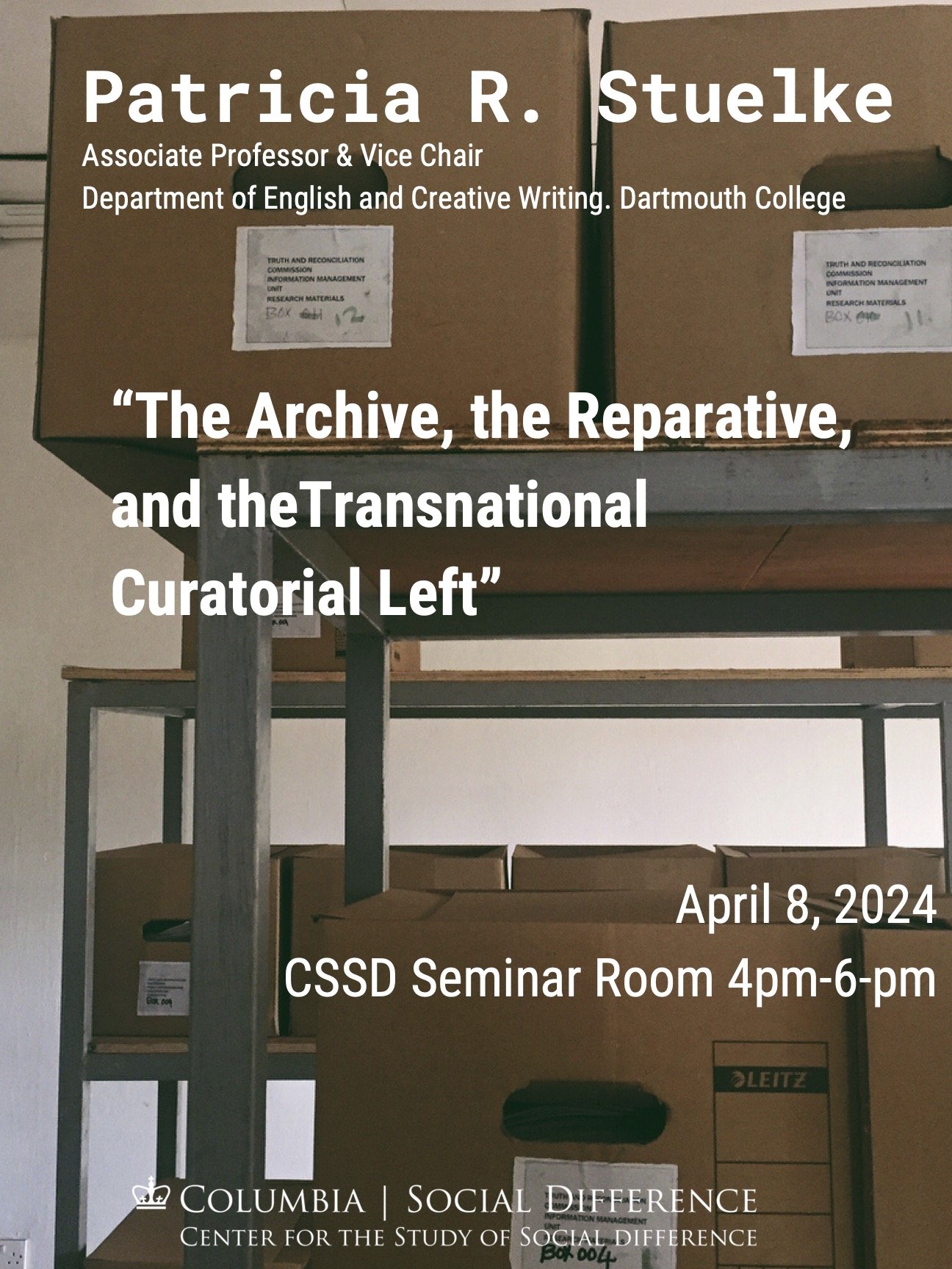
The Archive, the Reparative, and the Transnational Curatorial Left
The Recovery Working Group will be hosting Professor Patricia R. Stuelke, Associate Professor and Vice Chair of the Department of English and Creative Writing at Dartmouth College, on April 8, 2024 for a seminar titled “The Archive, the Reparative, and the Transnational Curatorial Left.”
When: April 8, 2024
4-6 PM
Where: CSSD Seminar Room
752 Schermerhorn Extension, CU
Attendance for this event is limited to Working Group members and invited guests.

The 49th Annual Scholar and Feminist Conference: Anti-Colonialism, Black Radicalism, and Transnational Feminism
When: Friday, March 22, 3-5 PM & Saturday, March 23, 9:30 AM - 6 PM.
Where: Event Oval, Diana Center, Barnard College
Conference Summary:
The Barnard Center for Research on Women and the Center for the Study of Social Difference’s Transnational Black Feminisms Working Group present the 49th annual Scholar and Feminist Conference. The conference will explore transnational Black feminism in the context of “third world” liberatory movements since the 1940s. At the height of struggles for anti-colonial independence in the African subcontinent and diasporic communities during the 1960s and 1970s, the praxis of Black feminist alliances proved to be foundational to global anti-racist and anti-imperial radicalism. We aim to consider how Black feminist solidarity was forged across a broader geopolitical frame that includes the Indian, Atlantic and Pacific Oceans, strengthening local mobilizations and generating new transnational liberatory possibilities. We will also chronicle the evolution of transnational Black feminism since then, and how the shift from ant-colonialism to neoliberalism impacted the radical possibilities embedded in attempts at self-determination and collaboration across geographic divides.
Conference Schedule:
Friday, March 22
3:00 p.m. | Welcome by Janet Jakobsen (Co-Director, Barnard Center for Research on Women and Claire Tow Professor of Women's, Gender, and Sexuality Studies, Barnard College)
3:30-5 p.m. | Marxism and Transnational Black Feminist Liberation
Charisse Burden-Stelly (Associate Professor of History and African American Studies, Wayne State University)
Dayo Gore (Associate Professor, Department of African American Studies, Georgetown University)
Robyn Spencer-Antoine (Associate Professor of History and African American Studies, Wayne State University)
Keeanga-Yamahtta Taylor (Hughes-Rogers Professor of African American Studies, Princeton University)
Moderated by Premilla Nadasen (Co-Director of BCRW and Ann Whitney Olin Professor of History, Barnard College)
Saturday, March 23
9:30 a.m. | Welcome by Janet Jakobsen (Co-Director, Barnard Center for Research on Women and Claire Tow Professor of Women's, Gender, and Sexuality Studies, Barnard College) and Premilla Nadasen (Co-Director of BCRW and Ann Whitney Olin Professor of History, Barnard College)
10-11:30 a.m. | Black Women and Anti-Colonialism 1940s-1980s
Lynette Jackson (Associate Professor of Gender and Women’s Studies and Black Studies, University of Illinois-Chicago)
Laurie Lambert (Associate Professor of African and African American Studies, Barnard College)
Paula Marie Seniors (Associate Professor of Africana Studies in the Department of Religion and Culture, Virginia Tech)
Moderated by Imaobong Umoren (Associate Professor of International History, London School of Economics)
11:45 a.m. - 1 p.m. | Lunch
1-2:30 p.m. | The Colonial Legacy, Gender, and Economic Empowerment
Yolande Bouka (Assistant Professor of Political Studies, Queen’s University)
Jennifer Fish (Professor of Women’s and Gender Studies, Old Dominion University)
Natasha Lightfoot (Associate Professor of History, Columbia University)
Keisha-Khan Perry (Presidential Penn Compact Associate Professor of Africana Studies, University of Pennsylvania)
Moderated by Tami Navarro (Assistant Professor and Chair of the Africana Studies Department, Drew University)
2:45 - 4:15 p.m. | Intellectual and Activist Interventions in Contemporary Movements
Layla Brown (Assistant Professor of Cultural Anthropology & Africana Studies, Northeastern University)
Tao Leigh Goffe (Associate Professor of Africana, Puerto Rican, and Latino Studies, Hunter College)
Zifeng Liu (Postdoctoral Scholar in the Africana Research Center, Pennsylvania State University)
Gabriella Muasya (PhD Student in the Department of Educational Anthropology and Educational Psychology, Danish School of Education)
Moderated by Tami Navarro (Assistant Professor and Chair of the Africana Studies Department, Drew University)
4:30 - 6 p.m. | Keynote
Lorgia García Peña (Professor of African American Studies and in the Effron Center for the Study of America, Director of the Program in Latino Studies, Princeton University)
Tami Navarro (Assistant Professor and Chair of the Africana Studies Department, Drew University)
Co-Sponsors
This conference is cosponsored by Barnard Center for Research on Women (BCRW) the Transnational Black Feminisms Working Group and the Center for the Study of Social Difference, Columbia University.
Accessibility
Visit the BCRW event page for information on accessibility.

Sensitive Subjects: Vulnerability, Care, and Chronic Illness
The Recovery Working Group welcomes Kalindi Vora, Professor of Ethnicity, Race, and Migration, and Women’s Gender and Sexuality Studies at Yale University, to discuss her new research project on autoimmunity as a way to get at chronicity, or the enduring conditions from which there is no recovery and which highlight the shortfalls of conventional medicine as a modality of care.
When: March 4, 2024
6-8 PM
Where: Schermerhorn Extension, Room 752
Description: This talk presents ethnographic evidence that attention to sensitivity, in both patients and health care providers, can amplify the valuable knowledge people with chronic illness have about health, care, and medicine that physicians may not.
Sensitivity is often equated with weakness in the United States. However, like the tiny lungs of the canary in the coal mine, which take on atmospheric gasses at many times the rate of humans, sensitivity can be a harbinger of what is to come for everyone else. The canary served as a warning of a toxic environment. Sensitive humans indicate what kind of social, environmental and medical conditions may eventually become unlivable for everyone else as well. Their knowledge can also include information for how to change our shared health environment for the better. Medicine, both conventional and alternative practices, is trying to keep up with unprecedented numbers of chronically ill patients. Many people are engaging in their own research and self-treatment and sharing their experience with communities online. In these practices online we see another side of the story of America’s shrinking state support for healthcare. We also see how the lure of ever-present internet advice, both information and misinformation, has changed our experiences of diagnosis and care.
This event is open to all Recovery Working Group Members and invited guests.

Seminar with Eleanor Johnson & Jonah Rowen
Plate 1, “The Colonial House,” from Carl Bernhard Wadström, An Essay on Colonization (1794)
The Extractive Media Working Group will be hosting scholars Eleanor Johnson and Jonah Rowen on March 4, 2024, to discuss their recent work.
When: 6 PM
March 4, 2024
Where: Schermerhorn Hall, Room 934, Columbia University
Followed by a Reception in the Stronach Center.
Speakers:
Eleanor Johnson is Associate Professor in the Department of English and Comparative Literature. Her first book, Practicing Literary Theory in the Middle Ages (Chicago, 2013), explored the relationship between aesthetic experience and ethical learning in medieval culture. Her second book, Staging Contemplation: Vernacular Theology in Middle English Prose, Verse, and Drama (Chicago, 2018), analyzed how literary works strove to embody a feeling of union with God for medieval audiences. Her third book, Waste and the Wasters (Chicago, 2023), examines medieval ecosystemic thought and suggests how thinking with medieval ecological theory might shed light on our own environmental crises, policies, and attitudes. She is currently completing a book on the history of feminist law, religion, and film in America in the 1970s, and writing another on the history of feminism and horror in western culture.
Jonah Rowen is an architectural historian whose work concerns the British Atlantic World during the late era of enslavement and abolition. Taking into account the labor and materials necessary for buildings' production, his research focuses on intersections between the aesthetic, technical, and economic dimensions of architecture, often through close analysis of drawings and other visual forms. He is developing a book project on nineteenth-century Anglo-Caribbean colonial exchanges and buildings design and production, figured as technologies of risk management and security.
Readings:
Introduction, chapters 1, 2, and 4 from Eleanor Johnson, Waste and Wasters (University of Chicago Press, 2023)
Rowen Abstract
From its inception in 1792, the Sierra Leone Company was a profit-generating venture. For the company's Evangelical abolitionist investors, the capacity to produce wealth constituted the measure of worth. Yet the profits they intended to harvest from the freed Black American migrants whom they sponsored to establish a colony on the Western African coast were not just for profit's sake. Rather, they would demonstrate free Black people's self-sufficiency: a living rebuttal to white British enslavers' fabrications of benevolent enslavement. The model city that the Company's directors envisioned required physical infrastructure, so on the town's founding, they loaded a ship with components for prefabricated buildings for the settlers to assemble, laying out plans for a gridded, “ordered” town.
The Sierra Leone Company was a coalition of entrepreneurs, philanthropists, and reformed enslavers united by anti-slavery and religious zealotry—proclaimed a three-pronged mission: Trade; Cultivation (including buildings); and Civilization. Britain’s first permanent African colony was to demonstrate the viability of an economically productive Black society, in territory shared with active slave traders and Indigenous African groups.
Under enslavement, productivity presupposed coercion, but gradual liberalization initiatives like abolition and adoption of wage labor incentives facilitated modes of extraction previously alien to African nodes in the British imperial apparatus. Consequent new forms of interaction and exchange transformed the Sierra Leonean landscape, physically, financially, and politically. To ensure profitability, these speculators and colonists sought security, and the means of construction they employed and configurations of space embodied that concept. By analyzing their architecture and its features for mitigating their concerns, this project draws out questions of who and what they perceived to pose threats. This future-oriented disposition aligned with the capital-intensive venture to establish this new colony: architecture’s durable presence signaled a projective, lasting engagement to cultivate territory and return its products to the metropole. By generating wealth through agriculture, the Black settlers would legitimate their standing as British subjects.

Prison Education Information Panel
The Prison Education and Social Justice Working Group will hold an informational panel on March 4th at The Heyman Center, introducing graduate students from across Arts & Sciences to the range of paid opportunities to teach in prison contexts and support justice-impacted students through Columbia’s Justice-in-Education (JIE) Initiative.
When: Monday, March 4, 2024
12:30-1:45 PM
Where: The Heyman Center, Second Floor Common Room
Organized by Kate Suffern, who is currently Program Manager at JIE, the panel discussion among former graduate instructors (Mia Florin-Sefton and Nick Ide), students (Taylor Rae Almonte and Jennifer Berry), and JIE staff (Ivan Calaff) will allow prospective instructors to gain insight into prison education from those with first-hand experience. This event will help students from Biology, Physics, Astronomy, English, History, and more understand the nature of prison education and how they can get involved during their graduate careers.

Film Screening: Naeem Mohaiemen's Jole Dobe Na (2020)
Still from Mohaiemen’s Jole Dobe Na (2020).
When: 3:30 PM
February 23, 2024
Where: Lifetime Screening Room (5th floor, Dodge Hall)
The Seeds of Diaspora Working Group is excited to announce that their February meeting, a screening of Naeem Mohaiemen's film Jole Dobe Na, is open to attendance by all CSSD affiliates!
Naeem will be in attendance for a discussion of the film after the screening, which will focus on its portrayal of plant life and feeling.
A description of the film is below:
Jole Dobe Na (Those Who Do Not Drown), 64 min, 2020
In an empty hospital in Kolkata, a man confronts protocols of blood samples, a subtly discriminatory office, regulations against bribery, and an abandoned operating theater. There are no doctors, signs of life, or residue of death. His mind is on a loop of the last weeks of his wife’s life, when a quiet argument developed between them. When is the end of medical care, whose life is it anyway? If what use is a science that can detect plant emotions, invent fingerprint technology, but fail to give dignity to the end of life.

Extraction Time
Saharan oil infrastructure, ca. 1954. Credit: Philippe de Broca.
When: 6 PM
January 25, 2024
Where: Schermerhorn 934, Columbia University
The first CSSD sponsored event to start the 2024 year, the Extractive Media working group will host Caltech Professor of Visual Culture Brian R. Jacobson on January 25th. Professor Jacobson will provide attendees with a conversation on his current work on energy, the environment, art, and film, titled “Extraction Time.”
Brian R. Jacobson is Professor of Visual Culture at the California Institute of Technology and director of the Caltech-Huntington Program in Visual Culture. He is the author of Studios Before the System: Architecture, Technology, and the Emergence of Cinematic Space (Columbia University Press, 2015) and The Cinema of Extractions (Columbia UP, forthcoming in 2024) and editor of In the Studio: Visual Creation and Its Material Environments (University of California Press, 2020), winner of the Society for Cinema and Media Studies award for Best Edited Collection and the Limina Prize for Best International Cinema Studies Book. He is currently finishing a new book, The Art of Oil in France: A Global History, 1944-1975.

Un-Earthing Extractive Architectures
Still from The Reclamation Oil Sands, Theo Cuthand from Extractions (2022).
Nov. 15, 2023 | 6:00pm
Seminar
934 Schermerhorn Hall
Seminar discussion with Professor Macarena Gómez-Barris from Brown University on "Un-Earthing Extractive Architectures," with a response from Professor Debashree Mukherjee.

The Dangerous Art of Text Mining
jo guldi
Oct 11, 2023 | 6:00pm
Book Talk
934 Schermerhorn Hall
Extractive Media presents a book talk with renowned historian Jo Guldi as she discusses her recent book, The Dangerous Art of Text Mining (Cambridge University Press, 2022). This talk will include pre-circulated readings.
About the Speaker:
Jo Guldi completed her PhD in History at the University of California, Berkeley (2008) and is currently Professor (in Practice) of Quantitative Theory and Methods at Emory University. Previously, Dr. Guldi held positions mainly in Departments of History at the University of Chicago, the Harvard Society of Fellows, Brown University, and Southern Methodist University. Dr. Guldi's research into quantitative methods focuses on improving AI approaches to understanding our past. Her historical research concerns the history of property rights, the origins of eminent domain, and the story of rent control. Her articles have been published in the American Historical Review, Journal of Modern History, and Annales. From 2015-2021 she was PI of a $1 million NSF grant entitled "The Unaffordable World." Her award winning books have been covered in The Atlantic Monthly, Wall Street Journal, Boston Review, and Guardian.

The Remediation of Oil: Use-Value or Utility?
Lucas Well, Spindletop Oil Field, Beaumont, Texas. From William B. Phillips, Texas Petroleum: Bulletin of the University of Texas No. 5; The University of Texas Mineral Survey Bulletin No. 1, July 1901 (Austin: The University of Texas, 1901), n. p.
Oct 11, 2023 | 6:00pm
Lecture
934 Schermerhorn Hall
Reinhold Martin, an Extractive Media working group member and historian of architecture and media, presents a lecture on oil’s value in terms of its use as well as its utility. As a member at the Center for Comparative Media, the Institute of Comparative Literature and Society, and the Committee of Social Thought, as well as former the chair of the Society of Fellows/Heyman Center for the Humanities, Martin’s latest venture into the medium of oil is sure to be of interest to any and all working in the social sciences.
Lecture response by Extractive Media project co-director Zeynep Çelik Alexander.

The Cunning of Gender Violence: Securitization and the Violence of Law
Lila Abu-Lughod, Shenila Khoja-Moolji, Karen Engle, Janet R. Jakobsen, Vasuki Nesiah, and Rafia Zakaria
Oct 11, 2023 | 6:00pm
Panel Discussion
Online
Co-Sponsors: Barnard Center for Research on Women and the Center for the Study of Muslim Societies, Columbia University
The Cunning of Gender Violence (Duke University Press, 2023) examines how a previously visionary feminist initiative has become integrated into contemporary global affairs. Addressing the issue of violence against women and gender-based violence has become a prominent and influential agenda within international governance and legal frameworks, as well as being entwined with state violence and global security measures. Through the use of case studies involving Palestine, Bangladesh, Iran, India, Pakistan, Israel, and Turkey, as well as an examination of UN and US policies, the book uncovers the gaps and exclusions in this agenda. It also delves into the experiences of those who have endured such violence, ultimately challenging the narrative that portrays this agenda as a resounding "feminist success story."
About the speakers
Lila Abu-Lughod is the Joseph L. Buttenwieser Professor of Social Science and Director of the Center for the Study of Social Difference at Columbia University where she teaches anthropology and gender studies. Her scholarship, strongly ethnographic and mostly based on long-term research in Egypt, has focused on the relationship between cultural forms and power; the politics and ethics of knowledge and representation of the Arab and Muslim worlds; and the dynamics of gender politics and the international circulation of women’s rights talk. She has written many books, including Veiled Sentiments: Honor and Poetry in a Bedouin Society (1986/2006/2016) and Do Muslim Women Need Saving? (2013). She is the Co-Editor with Rema Hammami and Nadera Shalhoub-Kevorkian of The Cunning of Gender Violence: Feminism and Geopolitics.
Shenila Khoja-Moolji is the Hamad bin Khalifa al-Thani Associate Professor of Muslim Societies at Georgetown University. She is an interdisciplinary scholar with research interests in the fields of Muslim studies, feminist theory, South Asia, and migration. Professor Khoja-Moolji is the author of award-winning books which include Forging the Ideal Educated Girl: The Production of Desirable Subjects in Muslim South Asia and Sovereign Attachments: Masculinity, Muslimness, and Affective Politics in Pakistan. Her latest book, Rebuilding Community: Displaced Women and the Making of a Shia Ismaili Muslim Sociality, was recently published by Oxford University Press.
Karen Engle is Minerva House Drysdale Regents Chair in Law and Founder and Co-director of the Bernard and Audre Rapoport Center for Human Rights and Justice. She is also an affiliated faculty member of Latin American Studies and of Women’s and Gender Studies. Professor Engle writes on the interaction between social movements and law, particularly in the fields of international human rights law, international criminal law, and Latin American law. She is author of numerous scholarly articles and of The Grip of Sexual Violence in Conflict: Feminist Interventions in International Law (2020) as well as The Elusive Promise of Indigenous Development: Rights, Culture, Strategy (2010), which received the Best Book Award from the American Political Science Association Section on Human Rights.
Janet R. Jakobsen is Claire Tow Professor of Women’s Gender and Sexuality Studies at Barnard College, Columbia University, and Co-Director of the Barnard Center for Research on Women (BCRW). Her most recent book is The Sex Obsession: Perversity and Possibility in American Politics (2020), which was a 2021 Lambda Literary Award Finalist. With Ann Pellegrini she co-wrote Love the Sin: Sexual Regulation and the Limits of Religious Tolerance (2003) and coedited Secularisms (2008), and with Elizabeth Castelli she coedited Interventions: Academics and Activists Respond to Violence (2004).
Vasuki Nesiah teaches human rights, legal and social theory at NYU Gallatin where she is also faculty director of the Gallatin Global Fellowship in Human Rights. She has published on the history and politics of human rights, humanitarianism, international criminal law, reparations, global feminisims, and decolonization. Nesiah was awarded the Jacob Javits Professorship (2022), Gallatin Distinguished Teacher Award in 2021 and the NYU Dr. Martin Luther King Jr. Faculty Award in 2020. Her current book projects include International Conflict Feminism (forthcoming from University of Pennsylvania Press) and Reading the Ruins: Colonialism, Slavery, and International Law. A founding member of Third World Approaches to International Law (TWAIL), she is also co-editing TWAIL: A Handbook with Anthony Anghie, Bhupinder Chimni, Michael Fakhri, and Karin Mickelson (forthcoming from Elgar).
Rafia Zakaria is an author, editor, and attorney. She is a fellow at the African American Policy Institute and is a weekly columnist at The Baffler in the United States as well as for dawn, Pakistan’s largest and oldest English language daily, since 2009. Her column is syndicated in newspapers all over the world and is regularly republished in the Deccan Chronicle, The Wire India, Kathmandu Post, Sri Lanka Guardian, and New Straits Times, among others. Her latest book Against White Feminism (2021) was one of NPR’s “Most Favorite Books of 2021” In Fall 2016 she was part of the “How Should Journalism Cover Terrorism” Project at the Tow Center for Digital Journalism at Columbia University. Rafia is also the author of The Upstairs Wife: An Intimate History of Pakistan (2015) and Veil (2017).
Accessibility
ASL Interpretation will be provided. For additional accessibility needs please email skreitzb@barnard.edu.
This is an online event, free and open to all. Registration is preferred.
Iberian Soundscapes
This 2-day convening aims to explore the ongoing impact of Iberian histories in South Asia in shaping identities, social distinction, histories of merchant and commercial capitalism. We bring to the longue durée inquiry of Luso-Hispanic globality (15th century and beyond) a unique focus on histories of music and performance in South Asia and the Americas, particularly in Brazil. The conference brings together scholars, musicians, journalists, and other cultural producers to participate in a series of panel discussions and concerts at Yale University over two days.
Registration for the conference is available via Zoom: https://tinyurl.com/Iberian-soundscapes
Background:
Luso-Hispanic trade relations, settlements, and intimacies constituted a critical aspect of Spanish and Portuguese colonial expansion to the Americas, Asia, and Africa. We are especially keen to understand how Portuguese presence in South Asia markedly reshaped social and legal structures of caste, race, gender, and religion, even as they set the terms by which new mixed race communities would emerge in South Asia, or along coastal Africa, and Brazil, how these processes relate to the trade in human chattel, and new extractive economies--that assemblage which is today referred to by the term racial capitalism--but which demand broader rubrics to consider Portuguese mixed-racial categories that obscure race through assimilation, including in Portuguese-Indian formations of caste and other types of marginalization and difference that mark specific histories of labor, property, and merchant capitalism in the Pacific and Indian Oceans.
North American studies of race tend to focus on Atlantic histories of race-making and Protestant histories of liberal humanism. Portuguese and Spanish histories demand a different lens that accounts for the work of Catholicism and merchant capitalism that proliferated religious and racial categories as a means to regulate social mobility, land rights, and labor. Religious orders such as the Society of Jesus transformed Indigenous rituals of performance and music in efforts to Christianize local populations. The concept-metaphor of race in the Indian Ocean thus developed a distinct mode of discourse that begs how performance, music, and ritual formed part of histories of race and caste formation. This convening aims to bring together academics, journalists, and musicians to explore the role of race, caste, gender, music, and performance to consider the myriad ways that music, ritual, and performance have worked as forms of political affect in colonial and national projects, as well as in grassroots constitutionalism and political movements.
Program
Friday, October 7
1:00 p.m. – 2:00 p.m. WELCOME
K. David Jackson (Yale, Prof. of Luso-Brazilian Literatures and Cultures
Sunil Amrith (Yale, Prof. of History) Anupama Rao (Barnard, Prof. of Middle Eastern, South Asian, and African Studies)
KEYNOTE ADDRESS
Naresh Fernandes, “Sitar Goes Latin” (Editor, Scroll; author of Taj Mahal Foxtrot)
2:00 p.m. – 3:00 p.m. INTRODUCTION TO SOUNDSCAPES
Kevin A. Fellezs, “Learning to Listen with Empathy” (Columbia, Prof. African American Studies and Director of Center for Jazz Studies)
3:00 p.m. – 5:00 p.m. SOUNDSCAPES IN BRAZIL AND INDIA Susana Sardo, “Listening to the Post-Empire: Fado and Mando in Goa as Performative Devices for Cultural Sovereignty” (University of Aveiro, Assoc. Prof. of Ethnomusicology)
Micah Oelze, “Racial Counterpart, Colonial Rescoring: The Politics of Psychomusical Realism in Brazil’s Interwar Concert Scores” (Adelphi University, Assistant Prof. of Latin American History)
Gérald Estadieu, “Soundscape.AI – Sonic Perspectives on Macau” (Univ. of St. Joseph, Assistant Prof. in the Faculty of Arts and Sciences)
Pedro Aragão, “Connecting Sound Archives in Lusophone Countries: Challenges and Questions of the Libersound Project” (Univ. of Rio de Janiero, Assistant Prof. of Musicology
MODERATOR: K. David Jackson
5p.m. - 6:00 p.m. RECEPTION
Henry Luce Common Room
6:00 p.m. – 7:30 p.m. CONCERT
An Evening of Indian Ragas and Talas
8:00 p.m. DINNER FOR INVITEES Barcelona Wine Bar (155 Temple St.)
Saturday, October 7
9:00 a.m. – 9:30 a.m. BREAKFAST
9:30 a.m. – 11:00 a.m. THE SOCIAL SPACE OF MUSIC AND SOUNDS IN MUMBIA
Aneesh Pradhan (Online) “Patronage, Migration, and Performance: Goan Practitioners of Hindustani Music in Colonial Bombay” (Musician, Performer, Composer)
Rasika Ajotikar (Online) “Music and Anti-Caste Thought in Modern Western India” (Univ. of Hildesheim, Jr. Prof. of Ethnomusicology)
Urmila Bhirdikar (Online) “Riots and Ragas in Bhendi Bazaar: An Exploratory Report on a Place behind a Market in Colonial Bombay” (Shiv Nadar Institute of Eminence, DELHI-NCR, Assoc. Prof. of Sociology)
MODERATOR: Anupama Rao
11:00 a.m. - 1:00 p.m. ACCOUSTIC JUSTICE IN BRAZIL AND INDIA
Sérgio Infante, “Hearing Wrong? Hearing Right? Diplomacy, Development, and Brazil-India Relations” (Yale, Ph.D. Candidate in Global History)
Ana-Luiza de A. Claudio, “The Sounds and Echoes of the Alleys and Streets: A Perspective on the Oral Histories of the Rocinha Memory Project” (Columbia, Ph.D. Candidate in Latin American and Iberian Cultures)
Marcos Balter, “Camdomblé as a Point of Creative Departure” (Columbia, Prof. of Music)
MODERATOR: Ana Paulina Lee
1:00 p.m. – 2:00 p.m. LUNCH
2:00 p.m. – 4:30 p.m. SOUNDSCAPES IN CABO VERDE AND INDIA
Ângela Barreto Xavier, “The ‘New English America’ in a Brahmin Conspiracy against the Portuguese Imperial Domination” (Institute of Social Sciences at Univ. of Lisbon, Historian and Senior Researcher)
Ana Flávia Miguel, “An Irreplaceable Queen: Thoughts on Cape Verdean Music” (Univ. of Aveiro, Researcher of Ethnomusicology)
Felipa Vicente, “Words without Images (1860s - 1900s): Photography in Goa and by Goans, Before and Beyond Souza” (Institute of Social Sciences at Univ. of Lisbon, Historian and Researcher)
MODERATOR: Stuart Schwartz and Lisa Voigt
4:30 p.m. – 6:00 p.m. RECEPTION
Henry Luce Hall Auditorium
6:00 p.m. – 7:30 p.m. CONCERT
Brazilian Bandolim Virtuoso Tiago Souza Presents: Choro - Samba - Jazz
8:00 p.m. DINNER FOR INVITEES Atelier Florian (1166 Chapel St.)
Speakers
Marcos Balter (Columbia)
Fritz Reiner Professor of Musical Composition at Columbia University. He’s the recipient of the American Academy of Arts and Letters Music Award, John Simon Guggenheim Foundation Fellowship, Civitella Ranieri Foundation Fellowship, Tanglewood Music Center Leonard Bernstein Fellowship, and two Chamber Music America Awards. He has been commissioned by the New York Philharmonic, Los Angeles Philharmonic, Chicago Symphony, Orquestra do Estado de São Paulo, Geneva Camerata, Fromm Foundation, The MacArthur Foundation, and the Art Institute of Chicago, among others. His works are published by PSNY (Schott), and commercial recordings of his music are available through New Amsterdam Records, New Focus Recording, Parlour Tapes+, and Navona Records.
Naresh Fernandes is a journalist who lives in Bombay. He is the editor of Scroll.in, a digital daily, and a consulting editor at National Geographic Traveller India. Naresh was previously editor-in-chief of Time Out India, which has editions in Mumbai, Delhi and Bangalore. He has also worked at The Times of India and the Associated Press in Mumbai, and The Wall Street Journal in New York. He is the author of the widely acclaimed and prize-winning book, Taj Mahal Foxtrot: the definitive history of Bombay’s jazz age from the 1930s-1960s (Roli Books?, 2012); the product of many years of research, it was written up during his tenure as a Poeisis Fellow at the Institute of Public Knowledge at New York University. In his words, the book is about ‘listening to the city through the ears of its jazz fans and its jazz musicians.’ Naresh maintains an active blog on the archival material excavating through the work on Taj Mahal Foxtrot and has most recently authored a new book, City Adrift: A Short Biography of Bombay (Aleph books, 2013). His expertise on the transnational musical histories of the Goan and Anglo-Indian communities in India make him an invaluable addition to Modern Moves.
Ana Paulina Lee (Columbia) is Associate Professor and Director of Undergraduate Studies in the Department of Latin American and Iberian Cultures at Columbia University. She is the author of Mandarin Brazil: Race, Representation, and Memory (Stanford UP). Her research and teaching interests focus on formations of race, gender, nation, and citizenship; slavery and abolition, postcolonial studies; subaltern studies; literary theory; visual culture and performance, and cultural studies with a focus on 19th and 20th century Brazil and Luso-Hispanic Asia.
Anupama Rao (Columbia) is Professor of History and Director of the Institute for Comparative Literature and Society at Columbia University with research and teaching interests in gender and sexuality studies; caste and race; historical anthropology; social theory; comparative urbanism; and colonial genealogies of human rights and humanitarianism.
Registration for the conference is available via Zoom: https://tinyurl.com/Iberian-soundscapes
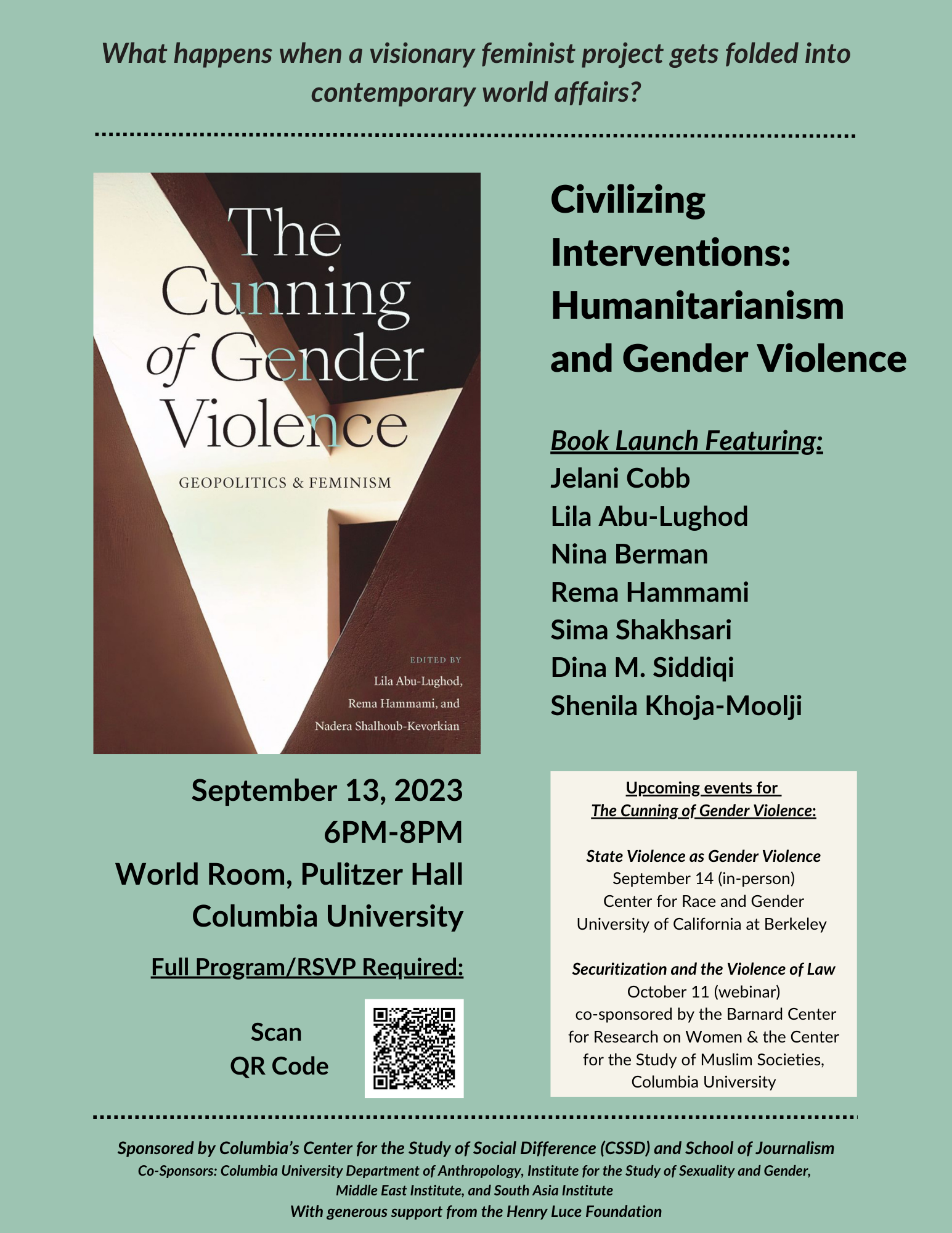
Book Launch: The Cunning of Gender Violence
Book Launch of The Cunning of Gender Violence: Geopolitics and Feminism (Duke University Press) edited by Lila Abu-Lughod, Rema Hammami, and Nadera Shalhoub-Kevorkian.
Introduction by Lila Abu-Lughod with panelists Nina Berman (Columbia Journalism School), Rema Hammami (Birzeit U), Dina Siddiqi (NYU), Sima Shakhsari (U of Minnesota), and Jelani Cobb (Columbia Journalism School). Moderated by Shenila Khoja-Moolji (Georgetown U).
RSVP Required. Click here to register.
The book emerged from the CSSD project Religion and the Global Framing of Gender Violence, supported by the Henry Luce Foundation.



